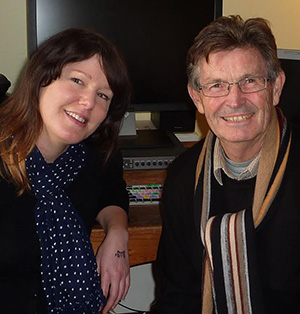Anna Majavu
AUCKLAND (Pacific Media Watch): One filmmaker has travelled a rocky path on his journey to making a gripping new historical documentary about climate change politics in New Zealand.
The new film, Hot Air, chronicles two decades of "political football" between those hoping to reduce greenhouse gas emissions, and followers of the "business as usual" approach.
It concludes that New Zealand’s largest industries collaborated "to ensure that no effective action to combat climate change is ever undertaken in this country", according to political commentator Chris Trotter.
Written, produced and directed by filmmaker Alister Barry with co-director Abi King-Jones, Hot Air screened across the country at the New Zealand International Film Festival this month.
The Funerals and Snakes podcasts website describes Barry as "the conscience of New Zealand documentary-making for over 40 years".
 Barry recorded the Moruroa demonstrations against French nuclear testing off the atoll in Polynesia in 1973, sailing there by boat and six years later formed a progressive group of filmmakers known as Vanguard Films.
Barry recorded the Moruroa demonstrations against French nuclear testing off the atoll in Polynesia in 1973, sailing there by boat and six years later formed a progressive group of filmmakers known as Vanguard Films.
Barry has also produced a history of the New Zealand Seamen's Union, and documentaries including Wildcat, Islands of the Empire (which looks at military relationships between New Zealand and America), Niuklia Fri Pasifik and Someone Else's Country which documents the period of Rogernomics beginning under the 1984 Labour Government.
Costly project
Purchasing archive footage from TV stations and needing about four years to research material for Hot Air meant that this historical documentary was a costly project to fund, Barry told PMW.
Although Barry was the recipient of a $4000 senior journalism award from the Bruce Jesson Foundation, and received some funding for post-production of Hot Air from the NZ Film Commission, these grants came nowhere near the $100,000 that the film cost to make.
"Getting this one finished and the problem of getting funding means I may not be making another film. There is no effective public interest film fund in New Zealand," Barry said.
The New Zealand Film Commission is only able to offer small grants for documentary makers, and climate change is "not really a sexy subject", Barry says.
In theory, the television funding body, NZ On Air is there to fund public service broadcasting says Barry. But it is difficult to get substantial funding from the body for a political film like Hot Air, because a film on climate change apparently has "no appeal to commercial broadcasters", and NZ On Air first requires an undertaking from one of the TV stations that they will screen the film.
There is a lot of competition for funding. Documentary or reality shows such as "Why Are We Fat?", "House Hunters" and "Bogan's Heroes" (a 10-part documentary series on what it is to be a bogan, or a person with an "unsophisticated" background) are more likely to see their funding applications succeed - these shows have been funded to the tune of more than NZ $1 million this year alone by NZ On Air.
The funding problem affects all filmmakers in New Zealand who make politically relevant documentaries, he says, with the result that political documentary making becomes "a very expensive hobby" rather than a viable job.
Another living
"The best way of sustaining a life of documentary making is to assume you can't make a living from it and make a living some other way", he says.
Barry will be largely self-distributing the film and hopes it will be a useful resource for communities in the Pacific islands and anyone interested in politics who wants to understand why the New Zealand government has not done much to combat climate change.
"I don't think they've done very much. They tend to follow the American or Australian line at international forums rather than championing the interests of the Pacific Island states," says Barry.
"If we are going to do something effective about addressing climate change, we need to understand the political forces at play and that is the way I see this as a useful and quite important film," he said.
NZ International Film Festival 2014 weblink
This work is licensed under a Creative Commons Attribution-NonCommercial 3.0 New Zealand Licence.




